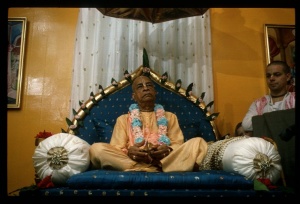SB 6.10.16: Difference between revisions
No edit summary |
(Vanibot #0054 edit - transform synonyms into clickable links, which search similar occurrences) |
||
| Line 23: | Line 23: | ||
<div class="synonyms"> | <div class="synonyms"> | ||
''tataḥ'' | ''[//vanipedia.org/wiki/Special:VaniSearch?s=tataḥ&tab=syno_o&ds=1 tataḥ]'' — thereafter; ''[//vanipedia.org/wiki/Special:VaniSearch?s=surāṇām&tab=syno_o&ds=1 surāṇām]'' — of the demigods; ''[//vanipedia.org/wiki/Special:VaniSearch?s=asuraiḥ&tab=syno_o&ds=1 asuraiḥ]'' — with the demons; ''[//vanipedia.org/wiki/Special:VaniSearch?s=raṇaḥ&tab=syno_o&ds=1 raṇaḥ]'' — a great battle; ''[//vanipedia.org/wiki/Special:VaniSearch?s=parama&tab=syno_o&ds=1 parama]-[//vanipedia.org/wiki/Special:VaniSearch?s=dāruṇaḥ&tab=syno_o&ds=1 dāruṇaḥ]'' — very fearful; ''[//vanipedia.org/wiki/Special:VaniSearch?s=tretā&tab=syno_o&ds=1 tretā]-[//vanipedia.org/wiki/Special:VaniSearch?s=mukhe&tab=syno_o&ds=1 mukhe]'' — in the beginning of Tretā-yuga; ''[//vanipedia.org/wiki/Special:VaniSearch?s=narmadāyām&tab=syno_o&ds=1 narmadāyām]'' — on the bank of the River Narmadā; ''[//vanipedia.org/wiki/Special:VaniSearch?s=abhavat&tab=syno_o&ds=1 abhavat]'' — took place; ''[//vanipedia.org/wiki/Special:VaniSearch?s=prathame&tab=syno_o&ds=1 prathame]'' — in the first; ''[//vanipedia.org/wiki/Special:VaniSearch?s=yuge&tab=syno_o&ds=1 yuge]'' — millennium. | ||
</div> | </div> | ||
Latest revision as of 22:25, 18 February 2024

A.C. Bhaktivedanta Swami Prabhupada
TEXT 16
- tataḥ surāṇām asurai
- raṇaḥ parama-dāruṇaḥ
- tretā-mukhe narmadāyām
- abhavat prathame yuge
SYNONYMS
tataḥ — thereafter; surāṇām — of the demigods; asuraiḥ — with the demons; raṇaḥ — a great battle; parama-dāruṇaḥ — very fearful; tretā-mukhe — in the beginning of Tretā-yuga; narmadāyām — on the bank of the River Narmadā; abhavat — took place; prathame — in the first; yuge — millennium.
TRANSLATION
Thereafter, at the end of Satya-yuga and the beginning of Tretā-yuga, a fierce battle took place between the demigods and the demons on the bank of the Narmadā.
PURPORT
Herein the Narmadā does not mean the Narmadā River in India. The five sacred rivers in India—Gaṅgā, Yamunā, Narmadā, Kāverī and Kṛṣṇā—are all celestial. Like the Ganges River, the Narmadā River also flows in the higher planetary systems. The battle between the demigods and the demons took place in the higher planets.
The words prathame yuge mean "in the beginning of the first millennium," that is to say, in the beginning of the Vaivasvata manvantara. In one day of Brahmā there are fourteen Manus, who each live for seventy-one millenniums. The four yugas—Satya, Tretā, Dvāpara and Kali—constitute one millennium. We are presently in the manvantara of Vaivasvata Manu, who is mentioned in Bhagavad-gītā (imaṁ vivasvate yogaṁ proktavān aham avyayam/ vivasvān manave prāha (BG 4.1)). We are now in the twenty-eighth millennium of Vaivasvata Manu, but this fight took place in the beginning of Vaivasvata Manu's first millennium. One can historically calculate how long ago the battle took place. Since each millennium consists of 4,300,000 years and we are now in the twenty-eighth millennium, some 120,400,000 years have passed since the battle took place on the bank of the River Narmadā.